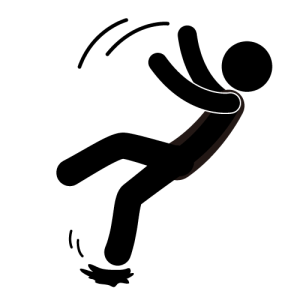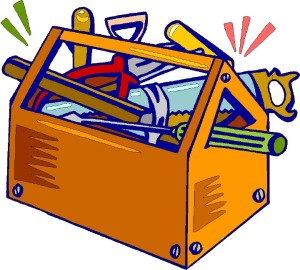Relapse:
- To fall or slide back into a former state.
- To regress after partial recovery from illness.
A falling back into a former state, especially after improvement.
Slip back.
A couple of months ago, I lost my toolbox. Major stress contributed to that. Life changing events like relocating, experiencing a near fatal car accident, becoming empty nester, losing a job, acquiring debt, and dealing with marital problems can all have significant effects in the already troubled mind, but when they all happened at once, or close to each other, the results can be devastating. I relapsed and was unable to use the skills I had learned in years of therapy and through insight to pull myself together.
Mental health patients usually refer to their toolbox when sharing how they stay achieve and stay in recovery. Individuals in recovery use skills as simple as a gentle touch to remain grounded in the environment, or as complex as writing a book as part of the healing process. As I progressed in my treatment and I counted the years since the onset of the illness, my toolbox slowly filled with the skills necessary to sustain recovery and help my family navigate the many obstacles and difficulties of living with mental illness.
A carried my toolbox around with pride. I called my doctor promptly if I noticed symptoms I couldn’t manage on my own. I structured my days in a way that I could enjoy a predictable yet flexible routine. I put a lot of effort in developing relationships and cultivating a loving and caring support network, making sure I was as ready to listen and offer love to friends going through a rough moment. I avoided toxic people and situations like the plague and did my best to maintain a healthy lifestyle that included nurturing my mind, my body and my soul. Most of all, I understood that crisis happen even in recovery and are temporary. Recovery is the hopeful promise behind every crisis.
But then life turned around again, and I regressed to a state I thought I had left behind. Crying spells, lack of concentration, spastic movement, racing thoughts, lack of sleep, loss of appetite, and more, all came at once in a full-blown crisis.
Accepting that I have relapsed took a few weeks. But somehow, in the darkest hour of a moonless night, I found my toolbox and asked for help.
Today, I am confident I am in the hands of skilled professionals that will help me through this moment. I accept the medication to alleviate the symptoms and reach a point where I can develop insight again. The promise of recovery is shining again like a star in a moonless night.
Recaer:
- Volver a caer.
- Caer nuevamente enfermo de una dolencia de que se había recuperado.
- Reincidir en los mismos vicios, errores.
Hace un par de meses que perdí mi caja de herramientas. El estrés contribuyó. Ciertos eventos como mudanzas, pasar por un accidente casi fatal, ver a los hijos crecer y dejar el hogar, perder un empleo, lidiar con problemas maritales pueden tener efectos significativos en la mente con problemas, pero cuando todos pasan a la vez o cerca los unos de los otros, los resultados pueden ser devastadores. Tuve una recaída y no fui capaz de usar las habilidades aprendidas en los años de terapia ni a través de la reflexión para levantarme de nuevo.
Los pacientes de salud mental se refieren normalmente a su caja de herramientas cuando hablan de cómo lograron recuperarse. Los individuos que se recuperan usan destrezas tan simples como un gesto suave para mantenerse anclado en el ambiente, o tan complejas como escribir un libro como parte de un proceso de sanación. A medida que progresaba en mi tratamiento y contaba los años desde de mi primera crisis, mi caja de herramientas se fue llenando con las destrezas necesarias para mantenerme recuperada y ayudar a mi familia a vencer los muchos obstáculos y dificultades de vivir con un enfermo mental.
Llevaba mi caja de herramientas con orgullo. Pedía ayuda a mi médico a tiempo si notaba síntomas que no podía manejar por mi cuenta. Estructuraba mis días de manera que pudiera disfrutar una rutina tanto predecible como flexible. Puse mucho esfuerzo en desarrollar relaciones y cultivar una red de apoyo llena de amor y dedicación, asegurándome de estar dispuesta a escuchar y ofrecer amor a mis amigos cuando ellos estuvieran pasando por un momento duro. Evitaba a la gente y las situaciones tóxicas como si fueran la plaga y hacía lo mejor por mantener un estilo de vida sano que incluyera el cuidado de la mente, del cuerpo y del alma. Lo más importante, es que comprendía que las crisis suceden aún en recuperación y que son temporales. La recuperación es la promesa de esperanza detrás de cada crisis.
Pero entonces la vida dio otro giro, y caí nuevamente en un estado que creía haber dejado atrás. Llanto a lágrima viva, falta de concentración, movimientos incontrolados, pensamientos acelerados, falta de sueño y de apetito, y mucho más, todo regresó al mismo tiempo en una crisis completa.
Me tomó varias semanas aceptar que estoy en recaída. Pero de alguna manera, en el momento más oscuro de una noche sin luna, encontré mi caja de herramientas y pedí ayuda.
Hoy tengo confianza que estoy en manos de profesionales competentes que me ayudarán a pasar por este momento. Acepto los medicamentos para aliviar los síntomas y alcanzar el punto desde dónde pueda aprender de la reflexión. La promesa de la recuperación brilla otra vez como una estrella en una noche sin luna.










Follow that bright star!
Thanks, Jennifer. I am trying.